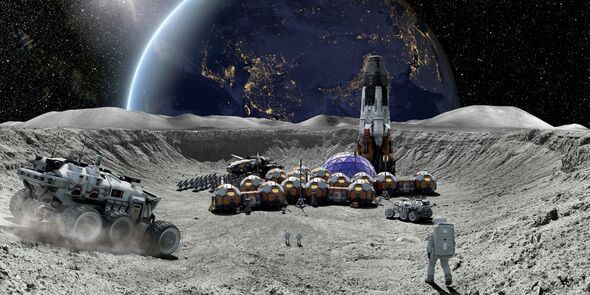Science
Scientists Envision Moon Habitats Powered by Nuclear Energy by 2030

The prospect of human habitation on the Moon could become a reality by 2030, according to experts who emphasize the crucial role of nuclear power in supporting sustainable life on the lunar surface. As various international space agencies, including NASA and the European Space Agency, advance plans for permanent lunar bases, the need for a reliable energy source has come to the forefront.
While solar power has been the traditional focus for space energy, its limitations are evident. The Moon experiences a prolonged night that lasts approximately 14 Earth days, making solar energy inadequate for consistent power needs. In contrast, nuclear energy offers a stable and efficient solution. Dr. Tim Gregory, a cosmochemist speaking at New Scientist Live in October, advocates for nuclear power, stating, “If you want people living on the Moon long term, you need a stable and consistent source of energy. That’s exactly what nuclear can do.”
Nuclear technology is often misunderstood, particularly regarding safety and environmental impact. Dr. Gregory points out that, per terawatt-hour of electricity generated, nuclear power is as safe as renewable sources such as wind and solar. He highlights that “more people die from fossil fuel air pollution every couple of hours than have died of nuclear power ever.” This perspective is critical as society grapples with the implications of energy production on Earth and beyond.
The notion of placing a nuclear reactor on the Moon aligns with NASA’s plans for lunar exploration. Dr. Gregory indicated, “NASA aims to put a nuclear reactor on the Moon by 2030. It sounds a bit ambitious to me, but even if they’re a decade late, it’s not that long to wait.” He expressed confidence that nuclear reactors will be operational on the Moon within his lifetime, potentially transforming human activities in space.
A major concern surrounding nuclear energy is waste management. Dr. Gregory reassures that the scale of nuclear waste is often exaggerated, stating, “If you powered your entire life from nuclear power, the waste would barely fill a wine glass.” He cited Finland’s geological storage solution for nuclear waste, which aims to contain radioactivity safely underground for a million years. This method has the potential to alleviate fears associated with nuclear waste and demonstrate its long-term viability.
Nuclear power’s compactness and fuel efficiency make it particularly advantageous for extraterrestrial utilization. As Dr. Gregory notes, “You couldn’t ask for a better technology to take with you if you want to live on another world.” The current global efforts to develop small modular reactors and other space-rated designs underscore the urgency of this technology in making lunar colonization feasible.
The implications of successfully integrating nuclear energy into lunar bases extend beyond mere power supply. A stable energy source paves the way for scientific laboratories, agricultural greenhouses, and manufacturing facilities on the Moon. Without such infrastructure, aspirations for sustained human presence on the Moon and future Mars missions may remain unfulfilled.
Dr. Gregory concludes with optimism about nuclear energy’s potential in space. He asserts, “Nuclear is misunderstood on Earth, but in space, I think people will quickly see its value. It’s clean, it’s safe, and it’s the key to making the extraordinary ordinary—living and working beyond our planet.” The vision of human life on the Moon is not merely a dream; it is a possibility that is steadily drawing closer to reality.
-

 Health2 months ago
Health2 months agoNeurologist Warns Excessive Use of Supplements Can Harm Brain
-

 Health2 months ago
Health2 months agoFiona Phillips’ Husband Shares Heartfelt Update on Her Alzheimer’s Journey
-

 Science2 weeks ago
Science2 weeks agoBrian Cox Addresses Claims of Alien Probe in 3I/ATLAS Discovery
-

 Science2 weeks ago
Science2 weeks agoNASA Investigates Unusual Comet 3I/ATLAS; New Findings Emerge
-

 Science2 weeks ago
Science2 weeks agoScientists Examine 3I/ATLAS: Alien Artifact or Cosmic Oddity?
-

 Entertainment4 months ago
Entertainment4 months agoKerry Katona Discusses Future Baby Plans and Brian McFadden’s Wedding
-

 Science1 week ago
Science1 week agoNASA Investigates Speedy Object 3I/ATLAS, Sparking Speculation
-

 World2 months ago
World2 months agoCole Palmer’s Cryptic Message to Kobbie Mainoo Following Loan Talks
-

 Entertainment3 months ago
Entertainment3 months agoEmmerdale Faces Tension as Dylan and April’s Lives Hang in the Balance
-

 Science1 week ago
Science1 week agoNASA Scientists Explore Origins of 3I/ATLAS, a Fast-Moving Visitor
-

 Entertainment4 months ago
Entertainment4 months agoLove Island Star Toni Laite’s Mother Expresses Disappointment Over Coupling Decision
-

 Entertainment2 months ago
Entertainment2 months agoMajor Cast Changes at Coronation Street: Exits and Returns in 2025









